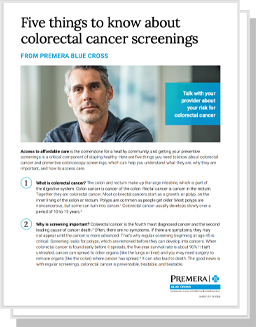Colorectal Cancer Screenings
A colorectal cancer screening is a test used to find abnormalities or problems early, before symptoms begin.
Need to catch up on this screening? Contact your primary care provider to schedule a visit.
Who should get screened?

AGES:
45 and older
Most people with an average risk should start screening at age 45.

Higher risk
If you have a strong family history of colon cancer, you may be covered for a colonoscopy at an earlier age. You may also be covered for more frequent or repeat screenings if you’ve had abnormal findings in the past.
The power of prevention
Discover why James and Gene got their colorectal cancer screenings and how the
power of prevention can help make sure you are around for more of life’s important moments.
Types of colorectal cancer screenings
There are different tests you can take:

Colonoscopy:
A gastroenterologist (GI provider) will use a small camera to examine your entire colon. This test is usually done every 10 years starting at age 45. The test includes a consultation prior to your screening and preparation, and gentle sedation is often used.

FIT (fecal immunochemical test):
An annual occult blood test (FIT) test is simple. You will collect a small stool sample at home and send it to a lab for testing. These tests can be an alternative to a colonoscopy, assuming you don’t have other risk factors.
Other tests:
There are also stool DNA tests and other testing methods. Ask your provider which test is best for you.
Anesthesia
Full anesthesia isn’t always covered as part of your colonoscopy. Your provider will determine what level of anesthesia is right for you to ensure you’re as comfortable as possible.
A request for “extra” or full anesthesia won’t necessarily be covered, and you’ll be responsible for this expense.
Preparing for your test
Colonoscopies include over-the-counter, pre-colonoscopy laxatives, also called “cleansing preparations.” Your plan coverage is limited to 2 preparations every 365 days, and they require a written prescription from your provider.
At-home screening options
At-home screening options have made colon cancer screenings much simpler. However, they’re not appropriate for everyone. Talk to your provider to determine if this test is recommended for you. Depending on your family history and risk factors, they might recommend one over another.
Are there accurate and
cost-effective at-home colorectal cancer screening tests?
Yes. FIT and FOBT tests are accurate and cost-effective at-home screening options. The fecal occult blood test (FOBT) and fecal immunochemical test (FIT) are both recommended by the U.S. Preventive Services Task Force for at-home colon cancer screenings. Although these tests are recommended annually, the total cost of annual FIT/FOBT tests remains less expensive (about $30.00) than a single Cologuard test taken every 3 years. The cost of the FIT/FOBT test is typically fully covered for members when prescribed as part of a preventive screening. We encourage you to discuss this option with your provider.


Is Cologuard more accurate than a traditional FIT kit?
No. Cologuard includes a patented DNA test unique on the market. However, Cologuard often leads to false positive results that aren’t explained by subsequent colonoscopy findings. These false positive results may generate unnecessary ongoing monitoring or anxiety for patients. The Cologuard test is also a more expensive test because of the DNA testing. Premera covers most of the cost for the Cologuard test; however, Exact Sciences Laboratories, the only company that offers the Cologuard test, will send you a bill for about $200, depending on your health plan.
What do the results mean?

Normal results:
No problems were discovered.

Abnormal or positive results:
Positive results might show polyps, blood, or inflammation. Your doctor may suggest more tests, if needed.
How much will it cost?
Most health plans, including yours, will cover your initial screening colonoscopy at no extra cost when you visit an in-network provider.
A follow-up colonoscopy is used when a cancerous polyp is found. This is not considered a screening and is subject to a copay and your deductible.
Note: This procedure can cost more than $2,000. Be sure you know the date of your last screening before you schedule your follow-up screening. If you’re unsure of when your last screening was done, contact your provider’s office. To check your coverage, contact us.
Please discuss all tests and screenings with your provider, as you may be required to pay a share of these costs. Also, verify that your provider’s lab of choice and endoscopy center is in network to avoid additional costs.
Next steps

Talk to your provider:
Ask about your screening options based on your age or personal risk factors.

Schedule your screening:
Contact your provider’s office to schedule a screening.

Stay informed:
Knowing your risks and keeping up with screenings can help catch problems early and improve health outcomes.
Establish care with a primary care provider
A primary care provider (PCP) who knows you well is vital to staying healthy. PCPs know your health history and can help guide you on your healthcare journey. If you don’t already have a PCP, you can find one by signing in to your account and using the Find Care tool.
Early detection helps save lives
Prioritize your well-being by staying on top of your colorectal cancer screenings. Talk to your healthcare provider about how often and when to be screened.
If you would like more detailed information about this covered screening. You can also download the 5 Things guide.

